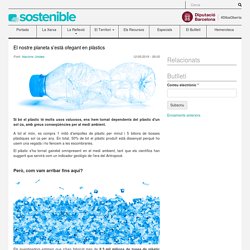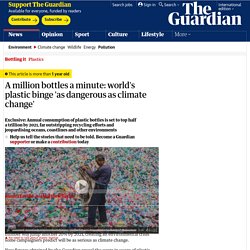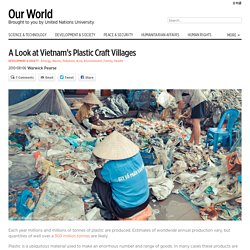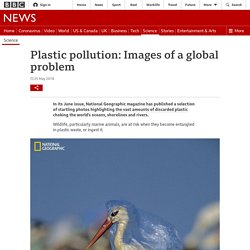

Humans have made 8.3bn tons of plastic since 1950. This is the illustrated story of where it's gone. El nostre planeta s'està ofegant en plàstics. A tot el món, es compra 1 milió d'ampolles de plàstic per minut i 5 bilions de bosses plàstiques sol ús per any.

En total, 50% de tot el plàstic produït està dissenyat perquè ho usem una vegada i ho llencem a les escombraries. El plàstic s'ha tornat gairebé omnipresent en el medi ambient, tant que els científics han suggerit que servirà com un indicador geològic de l'era del Antropocè. Però, com vam arribar fins aquí? Els investigadors estimen que s'han fabricat més de 8,3 mil milions de tones de plàstic des de principis de la dècada de 1950. Al voltant de 60% d'aquest plàstic ha acabat en un abocador o en el medi ambient. Estem veient altres tendències preocupants.
Aquests articles de plàstic d'un sol ús són a tot arreu. Necessitem frenar el cabal de plàstic en el seu origen Però també hem de millorar la forma en què gestionem els nostres deixalles, perquè en aquest moment la major part d'aquests acaba en el medi ambient. A million bottles a minute: world's plastic binge 'as dangerous as climate change'. A million plastic bottles are bought around the world every minute and the number will jump another 20% by 2021, creating an environmental crisis some campaigners predict will be as serious as climate change.

New figures obtained by the Guardian reveal the surge in usage of plastic bottles, more than half a trillion of which will be sold annually by the end of the decade. The demand, equivalent to about 20,000 bottles being bought every second, is driven by an apparently insatiable desire for bottled water and the spread of a western, urbanised “on the go” culture to China and the Asia Pacific region. More than 480bn plastic drinking bottles were sold in 2016 across the world, up from about 300bn a decade ago. If placed end to end, they would extend more than halfway to the sun. By 2021 this will increase to 583.3bn, according to the most up-to-date estimates from Euromonitor International’s global packaging trends report.
China is responsible for most of the increase in demand. A Look at Vietnam’s Plastic Craft Villages. Each year millions and millions of tonnes of plastic are produced.

Estimates of worldwide annual production vary, but quantities of well over a 300 million tonnes are likely. Plastic is a ubiquitous material used to make an enormous number and range of goods. In many cases these products are only used once — such as the 500 billion to one trillion plastic bags churned out worldwide every year. Much of the world’s plastic ends up as pollution in the land and the sea, to say nothing of the greenhouse gases emitted by its production and disposal. Photo Waterway at Minh Khai village. [quote quote=”Vietnam is home to an astonishing 2,800 craft villages that include not just those that make handicrafts for tourists, but some that specialise in recycling all sorts of discarded plastic, including from waste streams.” type=”image” image=”2178″ ] People who collect and recycle plastic therefore play an important role in reducing pollution and conserving resources. A family affair Larger investments. Home - Plastic Change : Plastic Change. Plastic pollution: Images of a global problem.
In its June issue, National Geographic magazine has published a selection of startling photos highlighting the vast amounts of discarded plastic choking the world's oceans, shorelines and rivers.

Wildlife, particularly marine animals, are at risk when they become entangled in plastic waste, or ingest it. Image copyright NAtional Geographic Trapped in a plastic bag at a landfill in Spain, this stork has a lucky escape - the photographer later freed it. One bag can kill more than once: carcasses decay, but the plastic lasts. Image copyright Jordi Chias / NAtional Geographic This loggerhead turtle has become entangled in an old plastic fishing net in the Mediterranean, off the coast of Spain. The turtle could stretch its neck above water to breathe but would have died had the photographer not freed it. Derelict fishing gear poses a major threat to large marine animals such as turtles. Image copyright SHAWNMILLER2014 Beachgoers collect the shells the crabs normally use, leaving their rubbish behind.